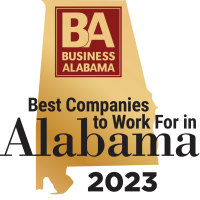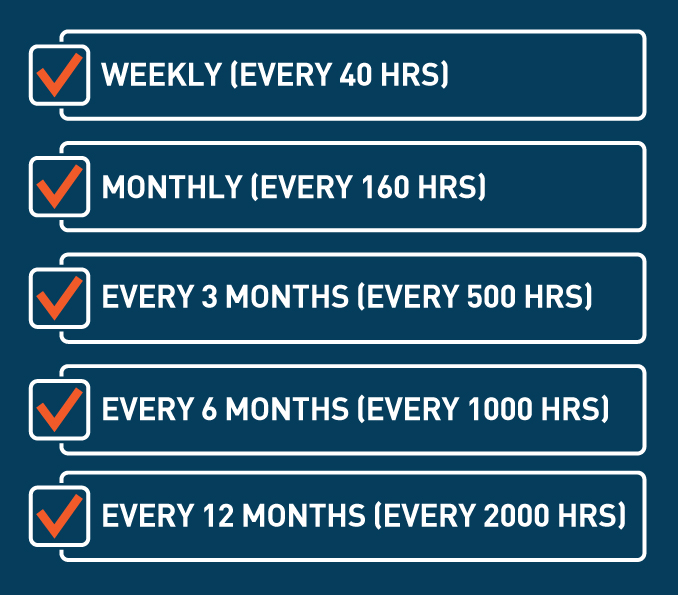
With nearly a century of researching, engineering and developing products for the air compressor market, we have made quality our number one goal. We provide uncompromising reliability and performance for the most demanding applications, and we didn’t just do that with our air compressors. We have developed a complete line of parts and fluids that are manufactured with superior quality and reliability to keep your Quincy compressor running at peak performance for many years to come.
While you’ll surely find other companies selling air compressor fluid that claims to be an appropriate substitute for our line of QuinSyn fluids, they are not identical and have not been designed with our specific engineering and your specific application in mind. To avoid excessive wear and unnecessary air compressor repair, always use the Quincy compressor fluid that was designed especially for your model and application.
Just as important as using the appropriate fluids, maintaining an appropriate service schedule is the way to keep your compressor operating at maximum performance with minimum cost. You should be going through an air compressor preventative maintenance checklist for a variety of time intervals to get the premium performance from your Quincy compressor.
How the Fluid Works With Your Air Compressor
Properly lubricating the parts of an air compressor is essential for efficient and long-term operation. With the right amount of the appropriate fluid, you will be protecting all the inner workings at the heart of your air compressor system.
The closed system of your air compressor works by the constant recirculation of fluid from the compressor to the receiver tank. After fluid goes through the oil separator in the receiver tank, it flows through a particulate filter. Then, it moves on through an air cooler to return back to the compressor.
When there is a mix of different fluids, or if a low-quality fluid is inserted, there will be insufficient protection due to reactions between impurities, especially if a mineral oil base has been used. There could also be varnish formation in the lubricant, which can plug up coolers and oil separators, as well as block the flow of oil to bearings that are highly dependent on the proper lubrication of the right viscosity.
The Danger of Using the Wrong Lubricant
If you mix two different fluids, you have essentially created your own concoction of lubrication. You can never know how this new mixture will chemically react in the high temperature atmosphere of the compressor and how long the life of the oil will be. You risk having to deal with the unfortunate consequences, like the ones listed below, of untested fluids circulating through your Quincy compressor:
-
Loss of system integrity with the introduction of lower quality lubricants
Our ISO-9001 and RC-14001 certified manufacturing facilities are managed with strict quality control so we can stay true to our reputation of producing products of legendary performance and reliability. We’ve engineered our fluids to the unique workings of specific applications, and we make our recommendations based on sound technical data supported by years of airend engineering data.
When lower-quality lubricants are mixed with our fluids, there will be a lower flashpoint, or auto-ignition temperature, resulting in increased fluid volatility that will impact fluid movement and operational efficiency. The base fluid created by other suppliers will not meet the specific requirements of an application that our tailor-made air compressor fluid would.
Over the years, we have seen a number of different types of products that are sold as a cheaper alternative to our compressor fluid. Through our analysis, we have determined they all tend to use lower-quality base fluids and components that will cause long-term system failure and drastically reduce the life of the compressor. This will actually cause the system to require more maintenance and air compressor repair.
Short-term savings in exchange for long-term losses won’t help your bottom line.
-
Incompatible base fluids
At Quincy Compressor, we have developed one of the widest ranges of ISO viscosity grades for various applications. Our compressors are used in some of the most demanding industries around the world, and we have customized our extensive line of lubricants to operate for peak performance in a wide variety of environments for a multitude of uses.
When air compressor fluids are mixed, they are rarely compatible with each other — causing them to negatively interact. This results in phase separation or air entrainment that is highly damaging to the system. With our wide array of viscosities, it would be difficult for another supplier to always have the right grade for your Quincy compressor. You would be offered the closest viscosity to our recommended fluid, most likely with the assurance that it’s “close enough to do the job.”
Adding the wrong grade of fluid is extremely risky as you could experience loss of the lubricant film or a loss of efficiency. It’s also possible to create drag by using a higher-viscosity product. One of the very important aspects of our fluids is how they maintain the proper viscosity across the wide range of operating temperatures of a Quincy compressor. This is fundamental to achieve the maximum airend life of the unit, and it’s not easy to determine with a substandard fluid substitute.
Mixing fluids will not only reduce bearing life, but it can also cause improper sealing between mating rotors that will reduce energy efficiency and compressor output. You won’t be able to determine how incompatible a competitor base fluid is with your Quincy compressor fluid, so don’t risk a detrimental system failure just to save some money upfront. Our compressors are factory-filled with the specific formulation determined by our airend engineers to provide just the right viscosity for the operating temperature.
There’s no safer bet for the long-term health of your air compressor system.
-
Additive issues related to incompatibility and solubility
The impact of additive incompatibility may not be evident for a long time. However, with the long life expectancy of a Quincy compressor that has had the proper air compressor service performed and high performance products used, it would be unfortunate to not get the best return on your investment.
Generic additive packages could contain detergents and dispersants that cause water absorption. These could end up interacting with our fluid additives for an unwanted creation of precipitation. General additive packs are used with a supplier’s base fluid supposedly to meet the requirements for various applications like hydraulics, gears and compressors. It’s a ‘blanket’ additive that will not be any long-term benefit to your Quincy compressor.
Maintain the integrity of your system, and don’t accept substitutes.
-
Performance issues related to foaming and water absorption
We have been able to provide our customers with a value-priced-over-time air compressor that has been a reliable aspect of their production and a truly cost-effective operation of their business. We’ve built dependable, premium performance products that are carefully engineered for a long life.
Our fluids are an ongoing part of our research and development that is at the cutting edge of technology, and many professionals in the industry can attest to the high quality of our lubricants for prevention of foaming and the control of water. Right next to viscosity, the control of water is a highly important factor to extend the airend life and keep the costs of air compressor service to a minimum.
Third-party fluids can contain components, like detergents, that will overpower our Quincy fluids. This could make it difficult to control foaming and water absorption, causing corrosion of your system. This ‘new’ fluid created by mixing fluids is unreliable and can be the culprit for loss of performance or major equipment failure.
The Genuine QuinSyn Fluid Advantage
We don’t make fluids for just any situation. We make them specifically for the operation of our air compressors and for the environments they are used in. You can be certain every step has been made to ensure what we fill each compressor with in the factory is the best available. You will not get that promise from any off-the-shelf lubricant.
Our proprietary QuinSyn base stocks and additive packages are highly refined based on years of research, development and demanding field trials. When you’ve bought the best air compressor, maintain it with the best fluids that provide considerable advantages over the substitutes:
- Maximum airend life with less downtime
- Less oil carryover due to low foaming rates
- Lower operating temperatures
- Prevention of varnish and carbon build-up
- Extended drain intervals, even at elevated temperatures
- A fluid sampling program that analyzes the condition of the fluid, providing an easy-to-read report to determine optimum drain intervals, possible contaminates and other operating conditions
- Compatibility with nearly every brand of air compressor
With our variety of options to match the criteria of each application, you can find the optimum performance fluid for your industry and specific environment to maintain the quality of your unit.
A Sample Air Compressor Preventative Maintenance Checklist
At the back of your Quincy Compressor Owner’s Manual, you’ll find a sample form that lays out the appropriate maintenance tasks to be completed for ideal performance. You can develop your own maintenance schedule that is geared to your specific application and environment, but some type of maintenance checklist is ideal to keep up on the daily, weekly, monthly and other routine maintenance tasks required throughout the year.
Quincy offers industry-leading warranty protection plans for a variety of products, with optional extended coverage, when genuine parts and fluids are used. We are able to offer exceptional warranty plans because we have done the research, field testing and engineering to create products and testing programs that will keep your air compressor running for the long-term.
Keep a maintenance checklist near your compressor so it’s easily accessible, and be vigilant about having the interval dates and initials entered to ensure regular attention is given to each task.
Also be sure the integrity of the inner workings of the air compressor is maintained by using the appropriate, clean tools for all maintenance tasks. It’s important all components are free of obstruction and contaminates.
Following are routine maintenance tasks to ensure maximum performance and a long service life for your compressor. Use these to guide you in developing a maintenance schedule designed for your particular application, and always follow the manual’s instructions for your specific model:
Daily (or every 8 hours)
- Check that the lubricant level is at the top of the sight glass or between the high and low level marks on the dipstick.
- Drain the receiver tank, and also drain the drop legs and traps in the air distribution system.
- Perform an all-over visual inspection for any abnormalities and ensure safety guards are in place.
- Listen and look for any strange noises or vibrations.
- Check for lubricant leaks.
- Check all pressurized components for rust, cracks and leaks.
Weekly (or every 40 hours)
- Manually operate the pressure relief valves to ensure they are working properly.
- Clean all the cooling surfaces of the intercooler, aftercooler and compressor.
- Look for air links in the compressor.
- Look for leaks in the compressed air distribution system.
- Inspect the lubricant for contamination and change if necessary.
- Consider whether you need to clean or replace the air intake filter.
Monthly (or every 160 hours)
- Check belt tension, if applicable
Every 3 Months (or every 500 hours)
- Change the lubricant.
- Rotate the pulley clamp screws or jamnut, if applicable
Every 6 Months (or every 1000 hours)
- Examine the compressor valves, and look for leakage or carbon build-up.
- If you find excessive sludge build-up in the crankcase, clean the interior as well as the screen.
Every 12 months (or every 2000 hours)
- Inspect the pressure switch diaphragm and contacts
- Inspect the contact points in the motor/starter
A similar list is available in your owner’s manual which includes more detailed information particular to your compressor and more specifications for the maintenance tasks. In harsher environments, you will need to perform some of these tasks more frequently. One of our authorized dealers will be able to inform you of the most appropriate maintenance schedule, and you can use our fluid analysis program to more accurately determine the best service for your compressor.
In addition to regular fluid sampling, you can determine if a system is being properly maintained and operating efficiently by tracking power, pressure and flow. When a new system is installed, the specifications regarding those components should be recorded, and you should continue tracking those three efficiency markers. By doing this, you can tell when the system is operating at full capacity and when capacity is decreasing. When you know your system is performing poorly, you can have the inefficiency fixed as soon as possible.
Contact Us Learn More Find a Dealer Near You
Protect Your Air System
Most problems that occur with industrial compressed air systems can be corrected or completely avoided with simple adjustments, elimination of unfavorable conditions, cleaning and replacement of parts. Not only will you experience little or no downtime due to system failure, but you will also be operating with better compression efficiency, dependable pressure and minimal energy consumption.
With the right compressor fluid and genuine parts for service and repair, you can avoid unnecessary expenses that take away from your profits. Be vigilant with your maintenance schedule and keep the quality where it should be with your branded warranty fluids to achieve the peak performance your Quincy compressor can provide.
Take care of your whole air system: the compressor, treatment system, distribution system and point of use components. They all work together to create better production for your business. Learn more about compressed air or contact one of our authorized dealers to discuss your specific air compressor needs.




